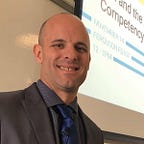Lessons and what’s next for “Low Floor, High Ceiling Mathematics”
In 2013 I was knee deep in curriculum redesign in Fresno Unified, posting lessons for 7th grade classrooms to use for free if they wanted too. The District had decided to forgo textbook adoption for the first year of Common Core and it was an exciting time! I hated the often prescribed, dry textbook problems and had been truly ignited by Dan Meyer’s 2010 Ted Talk and the incredibly rich math community on twitter and offline events like CMC. I was looking into how to prepare students for the new Performance Tasks in the SBAC test — multi step tests on computer that would carryover information from previous problems to make the assessment more ‘authentic’.
So, I created a group on Facebook to talk with other teachers about Performance Based Tasks in 2013.
Around 2016–17 with the publication of Jo Boaler’s Mathematical Mindsets, things stepped up a notch. I loved the label even more of ‘low floor high ceiling’ tasks — tasks that were like 3 Act Math tasks in that all students could do the basics, but some students could take it even further and solve the problems using multiple methods. So after a book study together, I even changed the name of the group to better reflect the kind of audience we were trying to get.
It’s been a joy over the past 9 years even as I left the classroom to oversee this group of math teachers and enthusiasts from around the world discuss and share tasks and ideas. In fact the group just passed 36,000 members, with about 1/3 coming from Australia and the rest the US and Europe. Myself and primarily a math teacher/coach in Stockton manage new members and remove spam, and occasionally start topics for discussion. I jump in discussions whenever I can contribute as well.
Over time the types of posts have often changed. It used to be people were creating their own stuff — with the exception of Mick Minas posting creative math games he and his family create, I mostly see people sharing things others have created from the likes of open middle, YouCubed etc. And that’s fine! It takes a lot of work to create truly accessible and creative tasks.
Mathematical Curriculum Background
Last year I read a book (Beyond Standards) hoping it would talk about how better standards could revolutionize education (because that’s sort of my ‘thing’), but instead it talked about how standards are an ineffective ‘lever’ for real change. The argument goes by the time the standards are translated to the classroom, the change in instructional practice or content isn’t strong enough — the real change happens when the curriculum is better. Being in tech for the past 8 years now, I’ve been thinking and exploring over the past year quite a bit about ways to accelerate learning by helping teachers come up with creative ways to engage students as well as students displaying what they know.
Artificial Intelligence
This is a great article by a former Edsurge writer turned investor Tony Wan about his experiences in the AI space and application to education. I love this quote as he talks about how AI may be good enough soon to write essays for students…
The optimist in me hopes GPT-3 will push us all to take a hard look at what we assign, how we assess, and why we’re doing it. What is the value of asking questions that can be answered by AI?
And math is the same way. If kids can answer the questions with PhotoMath, are we really asking them to THINK about the math or just plug and chug? Because in the real world calculators are everywhere and spreadsheets/applications rule the business math roost.
Instead, how about we use AI with writing and image creation to create compelling problem prompts, or match differentiation strategies with potentially every student in the classroom based on IEP needs and scaffolding demands? I feel it’s possible now, but needs refinement and true subject matter experts training it in ethical and creative ways.
Next up: Examples of this in practice!
